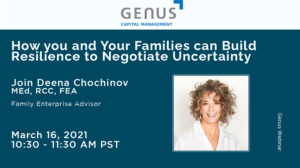Family wealth is about more than just finances. By nurturing these other essential aspects of family wealth, you can set the foundation for a long-lasting family legacy
And for some people, the pandemic year has also redefined how they manage family wealth. The loss of opportunities to access activities, goods and services we generally take for granted (think toilet paper, vaccines and family visits!) brought to light the need to take a more holistic approach to financial management, family legacies and the steps we take to value, preserve, activate and pass along family wealth.
It’s something Genus portfolio manager Grant Conroy has been thinking about a lot lately. Though he’s spent the last several years studying family wealth management, the pandemic made concrete some of the concepts he had previously understood only academically. “As Covid happened, I was hearing about families where the grandparents hadn’t been able to see their grandchild. These were people with a lot of financial resources who had never not done anything they wanted to do. And it made me think about the other wealths we have.”
Family wealth that goes beyond money
In his books (such as Family Wealth: Keeping It in the Family) and his wealth management work with families, author and lawyer James E Hughes Jr. defines family wealth as being broader than just financial assets.
He has identified five types of capital that comprise a family’s wealth: Financial, Intellectual, Social, Spiritual and Human capital (FISSH).
- Financial – The financial assets a family owns. This capital should be preserved and deployed to support the growth of the other capitals.
- Intellectual – The combined knowledge gained by family members through their life experiences. This includes education, career experiences, artistic talents, physical skills and general knowledge. It is the sum of what each member knows.
- Social – The relationships family members have with each other and with their communities, the quality and quantity of relationships within a family’s networks, as well as a family’s ability to make shared decisions.
- Spiritual – This can include family traditions, shared intentions, religious beliefs, family dreams, or the desire to be a family and sustain a ‘group’ beyond each person’s individual interests. This family value can often be seen in each member’s gratitude for one another and humility in understanding the benefits they get from that support.
- Human – The individuals who make up the family, and their physical and emotional well-being. Each member brings their sense of identity, achievement, meaningful roles or jobs and their individual pursuit of happiness to the table. Each member has a purpose.
While financial capital is clearly quantitative (it is measurable, can be split, and is easy to track), the other four capitals — intellectual, social, spiritual and human — are far more qualitative, harder to measure, and are often overlooked or simply not considered as part of the wealth of a family.
But here’s why they should be.
Broadening your thinking around how to manage family wealth can help to preserve your financial capital
In the early 1900s, the Rockefellers were the wealthiest family in the world. But by the 1970s, their wealth was on the decline, and today it is much diminished.
And it’s not an uncommon story with wealthy families.
According to Roy Williams and Vic Preisser, as detailed in their 2007 book Estate Planning for the Post-Transition Period, about 70% of estate settlements are followed by asset losses or a reduction in family harmony.
In other words, by the third generation, the descendants of wealthy families still have control of the assets only 3 in 10 times.
“Wealth dissipates over time due to many factors, such as a lack of communication between generations around a family’s values and intentions,” Conroy says. “People want to leave assets to help the next generations survive, but if you don’t spend time communicating and preparing the next generation, then it’s a risk.”
Evidence suggests that growing your family’s qualitative capitals helps to increase the overall wealth and, in turn, helps grow the quantitative or financial capital. “There are plenty of examples whereby education leads to more career choices, which leads to a growing self identity, feeling valued and happy and, in turn, leading to better financial outcomes,” Conroy says. “The biggest risk is ignoring the other capitals and having all your eggs in just one basket, with all the focus just on the financial capital.”
Recognizing and developing the non-financial aspects of family wealth not only creates a richer sense of success, it also helps to preserve financial capital. “For example, growing intellectual wealth in the family means that the current and next generation are better educated around saving and economics, so there’s a better chance that the wealth will survive,” Conroy says. Similarly, he adds, “financial wealth can be benefitted by having more relationships and connections.”
How to integrate additional types of family wealth into your financial plans
A broader approach to how you manage family wealth starts with an awareness that family wealth is larger than just finances. And this isn’t always a simple mindshift. “We live in a society where we work around things that can be measured,” Conroy says. “But if you disregard the other kinds of capital, it slows you down overall. As a financial manager, I encourage people to see the bigger picture. By naming the different kinds of wealth you’ve got, you can build it out. Then you can cultivate other things intentionally.”
In his book Complete Family Wealth, Hughes Jr. and his co-authors introduce an exercise all family members can go through to assess the levels of their qualitative capitals and create a starting point to work from. It involves having each family member rank various statements such as ‘I have a strong sense of personal identity’ or ‘I communicate with my family members about important topics’. This gives a starting point for each member in each form of capital, as well as a blended version for the family. By doing this every year or two, it’s possible to track the progress of the various forms of capital and build awareness of where individuals or the family may want to focus.
From there, consider implementing periodic family meetings, so members can get together to discuss things like family values, the intent behind financial plans, legacies (past and future) as well as the capital that everyone brings to the table in realizing the family’s goals.
Of course, simply appreciating what each family member contributes and acknowledging the diverse attributes, skills and strengths of your fellow family members can be a positive bonding process too. And that’s something we can all use after the year we’ve had.













